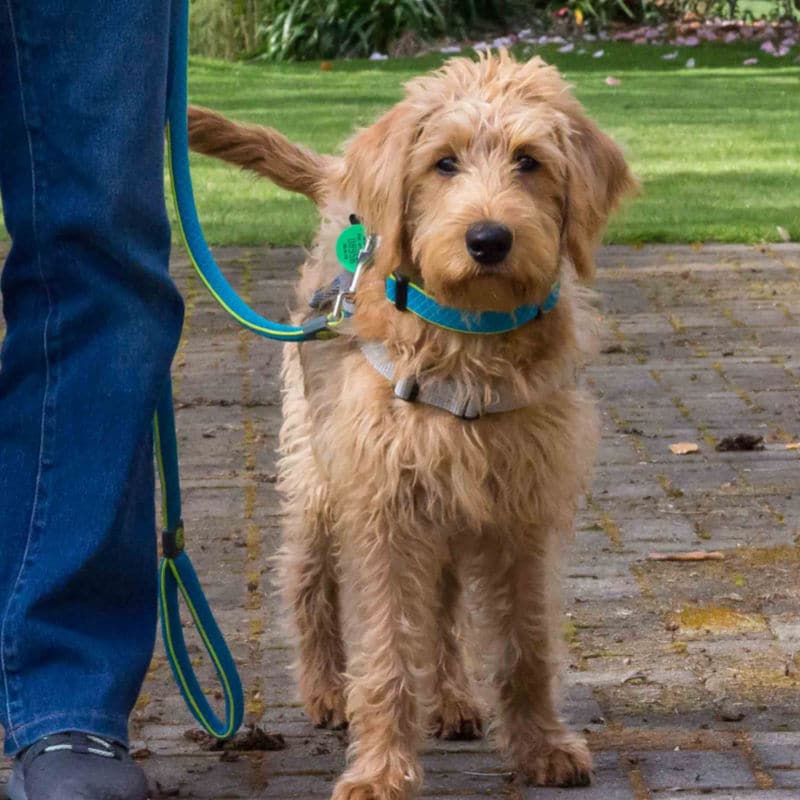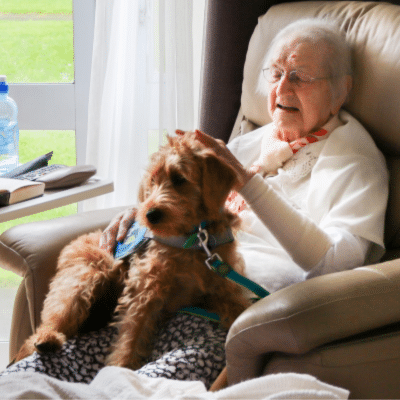What is a therapy dog
A therapy dog is trained to provide affection, comfort, support and love for children and adults with a physical or emotional disability.
Our puppies are trained from 8 weeks to 6 months of age, then placed with the client or family and given support to continue their journey towards becoming an accredited therapy dog at 12-15 months of age.
For those who don’t need the task-specific expertise of an assistance dog, a therapy dog may be a more suitable option for some people or families.
Every Person With A Disability Deserves Support.
Our therapy natured puppies are most suited to support people with Autism spectrum disorder (ASD), Global developmental delay, Down syndrome, Cerebral palsy, Post-traumatic stress disorder (PTSD), Anxiety disorders, Confidence issues, Depression, Chronic illness, Loneliness, Isolation and more.
Types Of Therapy Dogs
Disability Support Therapy Dogs
Our disability support therapy dogs can offer friendship, comfort, and companionship to those living with a disability. We provide disability therapy dogs for both children and adults.

Reading Support
Therapy Dogs
Reading can be a difficult skill to develop for many adults and children as emotions such as apprehension, stress, and anxiety can be an obstacle. Our reading therapy dogs provide support by helping the reader feel less nervous and self-conscious as they are reading to a furry friend.

Emotional Support
Therapy Dogs
Emotional support therapy dogs can support people with a range of psychiatric or intellectual disabilities from post-traumatic stress disorder to depression and anxiety issues. These dogs can provide companionship and support, help boost confidence and improve safety. We provide emotional therapy dogs for both children and adults.

Facility Therapy Dogs
Facility therapy puppies or dogs are usually personally owned by a person who works in a facility (like a school, hospital, dementia unit, hospice, or nursing home), or has been invited to enter a facility to provide therapy support on a regular basis.

Disability Support Therapy Dogs
Our disability support therapy dogs can offer friendship, comfort, and companionship to those living with a disability. We provide disability therapy dogs for both children and adults.


Reading Support
Therapy Dogs
Reading can be a difficult skill to develop for many adults and children as emotions such as apprehension, stress, and anxiety can be an obstacle. Our reading therapy dogs provide support by helping the reader feel less nervous and self-conscious as they are reading to a furry friend.
Emotional Support
Therapy Dogs
Emotional support therapy dogs can support people with a range of psychiatric or intellectual disabilities from post-traumatic stress disorder to depression and anxiety issues. These dogs can provide companionship and support, help boost confidence and improve safety. We provide emotional therapy dogs for both children and adults.


Facility Therapy Dogs
Facility therapy puppies or dogs are usually personally owned by a person who works in a facility (like a school, hospital, dementia unit, hospice, or nursing home), or has been invited to enter a facility to provide therapy support on a regular basis.
Frequently Asked Questions
Can you train my dog as a therapy dog?
No. Our therapy dogs are bred specifically for their role to ensure they have the right temperament. This means we do not train other dog breeds or personal family pets to become therapy dogs.
Are therapy dogs the same as service dogs?
Can a therapy dog go to public places?
Therapy Dogs New Zealand is planning to apply for access rights for clients that require their therapy dog to accompany them into restricted situations especially in the case of children with ASD or people with PTSD.
Is a therapy dog suitable for every family?
Is A Therapy Dog a Big Commentment?
Do Therapy Dog Applications Ever Get Declined?
We may also decline a therapy dog application if the person applying for a therapy dog is unable to manage the full care of the dog independently, and has no alternative support system in place to ensure the dog’s needs are always met.